Would you rather fight 1 horse-sized duck or 100 duck-sized horses?
Give it a minute and think about it. Reread it if you have to.
Hint: There is no right answer.
But I want you to pause and reflect on what parameters you are using to choose an answer? I am guessing that you are trying to figure out which is easier to fight and thereby more likely for you to succeed.
It makes complete sense.
Instinctively all of us would want to choose the path of least resistance. It saves us time, effort and energy while giving us similar results.
No wonder, the wise old men and women always said pick your battles wisely. When you focus on one battle at a time, starting from the easiest of battles, it will dramatically increase your chances of survival and success too. So not will you survive, you will thrive too.
That’s precisely how keyword research works too. Keyword research is all about picking the right battles and advanced keyword research is all about letting your competitors do the work for you.
Picking the right keywords is half the battle won.
And this is where more than half of the SEO guys make mistakes. If you choose the wrong battle, you will end up fighting a losing battle against the big guys and end up nowhere near the first page. Now, you wouldn’t want that, would you?
To draw an analogy, they say, when you go to the gym, lift with your body, not with your ego.
What this means is, when you first join the gym, you shouldn’t be trying to lift the heaviest weights. Now, your ego would definitely try to tell you “hey, if he can do it, so can you bro, just go for it” but you shouldn’t go for it.
Why?
Because not only will it be extremely difficult for you to lift heavy weights on day 1, you might also risk injuring yourself which in turn will not allow you to go back to the gym at all.
The solution is to slowly build your strength and condition your body and mind to be able to lift heavy weights eventually.
Exactly like that, you should choose your keywords wisely, starting from the easiest, and condition your website to rank for tougher keywords.
Don’t try to rank with your ego; you’ll fail.
But then, how do you rank? By choosing the right keywords, creating content around it and optimising your content for relevancy.
It’s actually that simple, and in this article, I will show you how exactly you can do that.
Oh, and don’t be mistaken when I mention “Lazy” in the title. Lazy is not always bad.
Lazy can mean efficient and also means better chances of success. (What’s up Lazy G)
Also, since this is advanced keyword research it would require you to use premium tools. Nevertheless, it’s a great way to not only to find amazing keywords but also understand how Google perceives content and build on top of that.
How to do Advanced Keyword Research?
Keyword research is all about finding problems.
The queries that your audience puts in Google are the problems that they are facing and are looking for solutions.
With keyword research, you are trying to find you whether people have a given problem AND how many people have the same problem (search volume)
The typical way of going about this is to start with a broad keyword, in your favourite keyword research tool, shortlist keywords, check for competition and then go for the keywords to target.
But you will notice that there is a lot of discrepancies between the data shown by different tools. This is because all the data you see are just forecasts, and you will never know for sure whether this trend will hold and Google will understand your content the way you are trying to make it understand.
What if there is a better way to understand your users and their problems, understand how Google perceives existing solutions and then work from there?
Let’s understand how to you too can do advanced keyword research in a few simple steps.
Step 1: Choose a broad keyword and look for competitors
To start with this method, you need to go as broad as possible but not too broad where there is no intent behind the keyword.
For example, for my post, “What is a niche and How to find your Niche”, I start from the keyword “how to find your niche”.
I go to Google and put in the search query, and this is what I get:
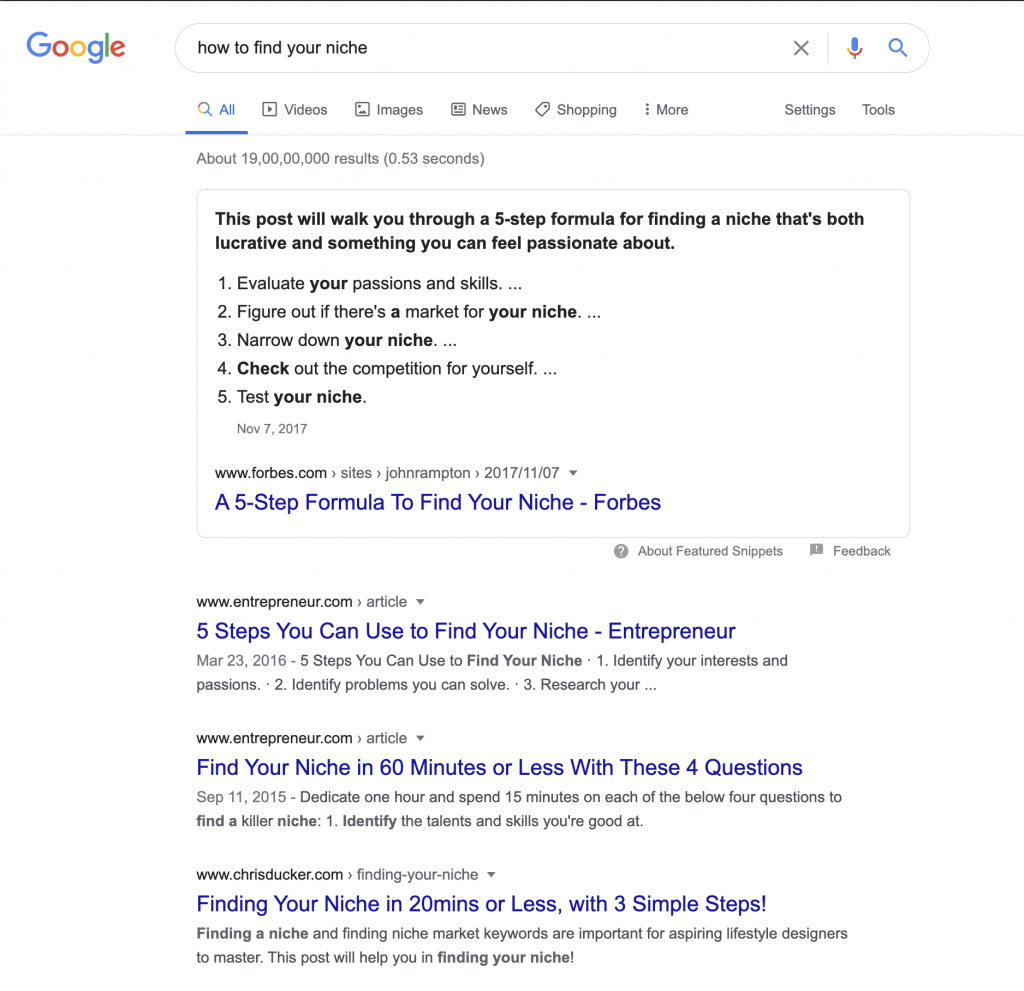
From here, I am going to pick up 3-4 URLs which are ranking for this keyword.
For this example, I chose the following URLs:
https://www.entrepreneur.com/article/272808
https://www.chrisducker.com/finding-your-niche/
https://nichehacks.com/ultimate-guide-finding-niche-market/
As you can see, this is a good mix of websites, 2 of which are major publications, 1 of which is a personal brand, and the other is a niche-specific website about niches!
Now, these are my “competitors”.
But don’t be mistaken, these guys can give you more information than your best friend would.
Step 2: Check out the keywords your “competitors” are ranking for
You need a premium tool to do this. You can do it with Ubersuggest and Google keyword planner too, but it’s not as accurate and doesn’t give you as much information as premium tools do.
I am going to use SEMrush for this example, but you can do the same with Ahrefs also.
PS: SEMrush has a 14-day trial with which you can easily accomplish this.
In SEMrush, I go to “Domain Analytics”> “Organic Research” and put in my “competitor” URLs one by one.
Let’s start with my first URL and see what shows up.
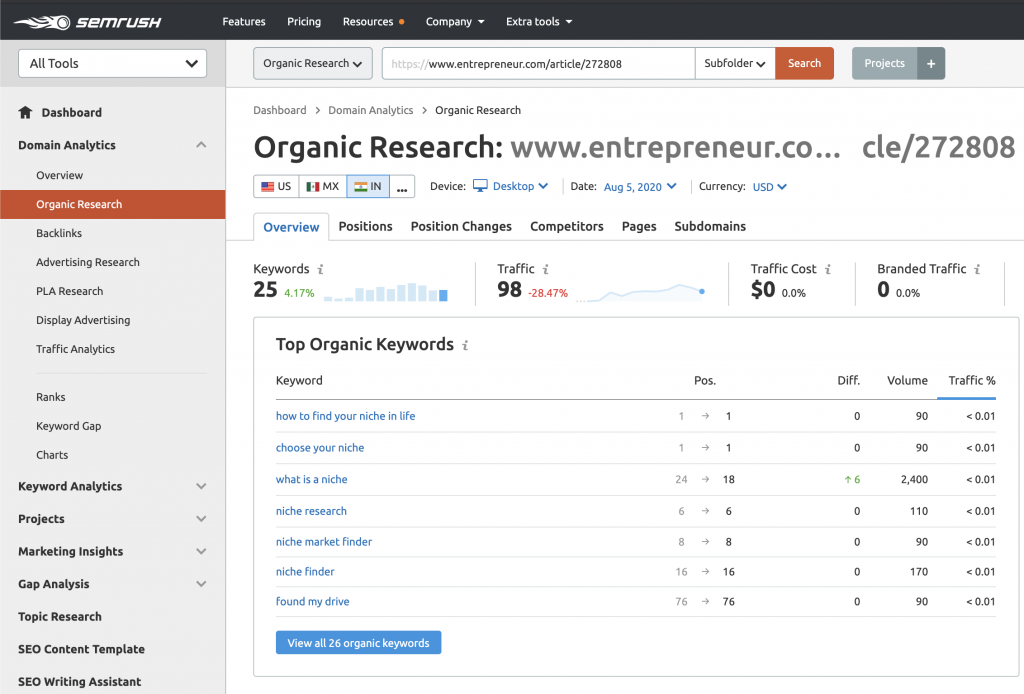
As you can see, this URL is ranking for a good number of keywords but not enough. This is because I have chosen India as the country, so I am going to go ahead and change the country to the US and see what happens.
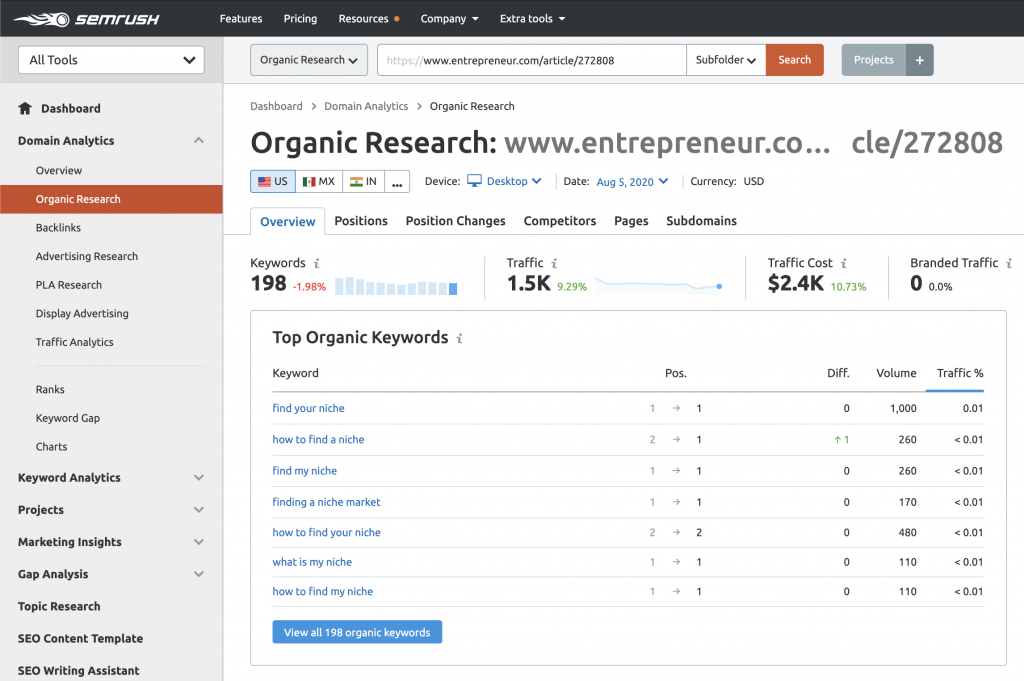
5X more results!
Now I am going to click on “Positions” which is going to show me which position the URL in question is ranking for all these keywords along with plenty of other information.
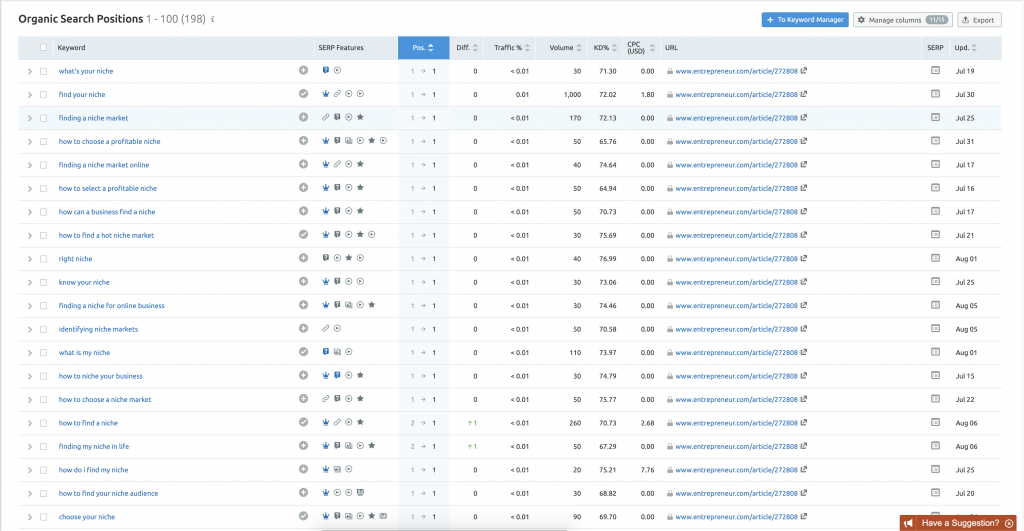
I am going to start shortlisting keywords which I think are relevant and informational in nature (what, why, how, guide, tutorials etc). To do this, I just need to click on the “+” icon right next to it. When you do that, it gets added to the “Keyword Manager”.
You need to do this for all your competitor URLs and shortlist keywords you think are relevant and most importantly have a strong intent and are informational in nature.
Step 3: Collate and segregate keywords, especially the informational keywords.
After step 2 of keyword research for all your “competitors”, you should end up with a handful of keywords.
As you can see in the screenshot below, I ended up with about 59 keywords with a total search volume of 84K.
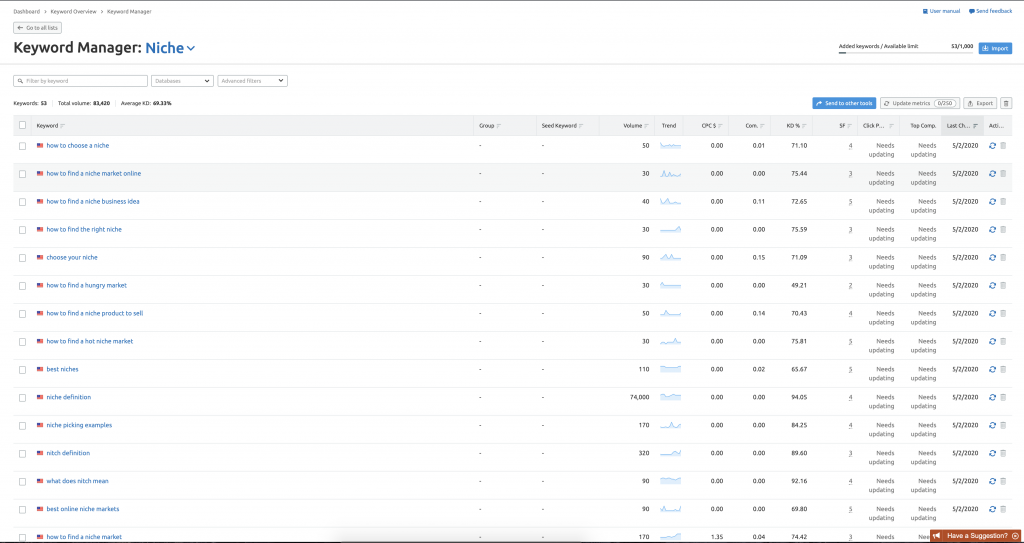
I am going to now click on the “Export” option and get this data in CSV format.
I will now be able to segregate the keywords and group them based on similar themes. This is how it looked before segregation:
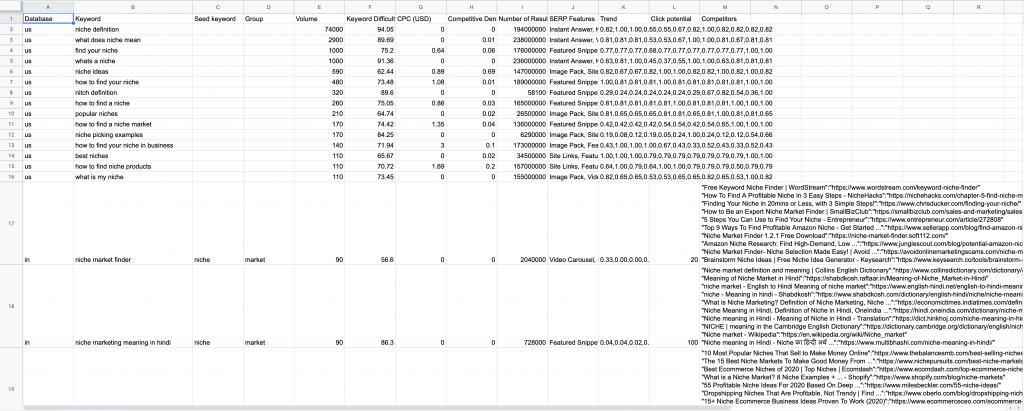
This is how it looked after segregation:

As you can see, I have grouped thematically similar keywords, with special emphasis on informational and educational keywords?
But why this special emphasis for informational keywords?
To elaborate this, I am going to go on a slight tangent. Check out the search intent funnel.
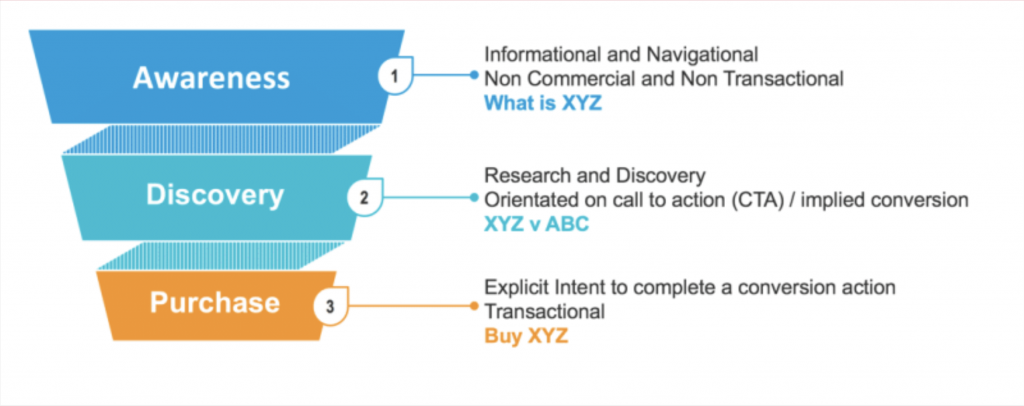
This funnel represents the journey all your customers take (including yourself as a customer).
When it comes to keyword research, most SEO guys recommend you to go for commercial keywords, keywords which have a strong intent for purchase. Now, this might seem like the most obvious thing to do, but this has two very crucial problems.
- With the advent of social media commerce, a lot of people who are in the transactional part of the funnel are hijacked by social media websites. A lot more people transact directly through social media, thanks to remarketing and behavioural targeting. This means you have a lot fewer people in the transactional part of the search funnel than you thought you would.
- And with whoever is left, you have a second problem: You start competing with the big guys. Of course, the big guys would want every piece of the transactional part of the funnel and considering how Google prefers brands in the SERPs you will be destroyed by Amazon, Flipkart, Youtube and other high authority websites of the world.
Now to circumvent these problems, I recommend moving higher up the search intent funnel and target keywords which are informational and educational in nature.
What this allows you to do is first, capture your audience at a much earlier stage of the purchase funnel and also you are NOT fighting the big guys here. The big guys don’t care about the informational keywords because it is just too much for them to go after so many informational keywords. They are happy with the transactional part of the search funnel. (Remember the duck-sized horses and horse-sized ducks?)
And that’s what you need to capitalise on and go after informational keywords while performing keyword research.
And the best part is not only are informational keywords easy to rank for, once you rank, it will also allow you to attract a lot of links. This newfound authority will then let you to go after tougher keywords which have a commercial intent.
Great, I hope I have made my point clear and now that we have good easy to rank for keywords, let’s create content around it.
Recommended: How to Speed up Your WordPress Site & Make It Load Faster
Step 4: Write content around it with minimal keywords
I know that the thought of writing content might send a shiver down your spine.
If it makes you feel any better, it’s completely normal, and almost everyone reading this piece would be facing it.
This happens because you have been (mis)informed that you need to be a creative person to write content.
Let me bust that myth for you: You don’t necessarily have to be creative.
You can start with being useful, and the easiest way to be useful is by solving your audience’s problem.
Thanks to your knowledge of advanced keywords research, you now know the problems your audience is facing, you just have to articulate a simple solution that your audience can implement.
For this, I recommend you follow my WWH framework, and this is what it looks like:
What – Describe the problem and your solution
Why – Describe why your solution is the best solution
How – Describe how to implement your solution.
You can see that I have used this exact framework in this blog here:
https://sanjayshenoy.com/find-your-niche/
This not only allows you to get over your writer’s block but also allow you to solve your user’s problems in the most articulate manner.
And please, don’t obsess over keyword density which is an obsolete concept and instead aim for topical depth.
Topical depth is when you try and address as many problems as possible around a particular topic. You can achieve this through proper keyword research and find as many informational keywords as possible and address them through your content. This will also help you create in-depth content around a particular topic which not only Google will love but most importantly, your users.
If you observe in my blog post, I have addressed almost all the problems my audience might be facing, which I figured during my keyword research.
Step 5: Check for performance in the search console and optimise it better.
When people ask me which is my favourite keyword research tool, I always tell them that it is Google Search Console.
Search Console gives you the most accurate information because it doesn’t provide you forecasts but gives you what already has happened. And more importantly, how Google sees your content and for which keywords your content is being shown.
So once you are done publishing your in-depth blog post, head to the search console in a few days and check the queries for which your new blog post was triggered. Here is my search console for the blog post What Is a Niche and How to Find Your Niche? :
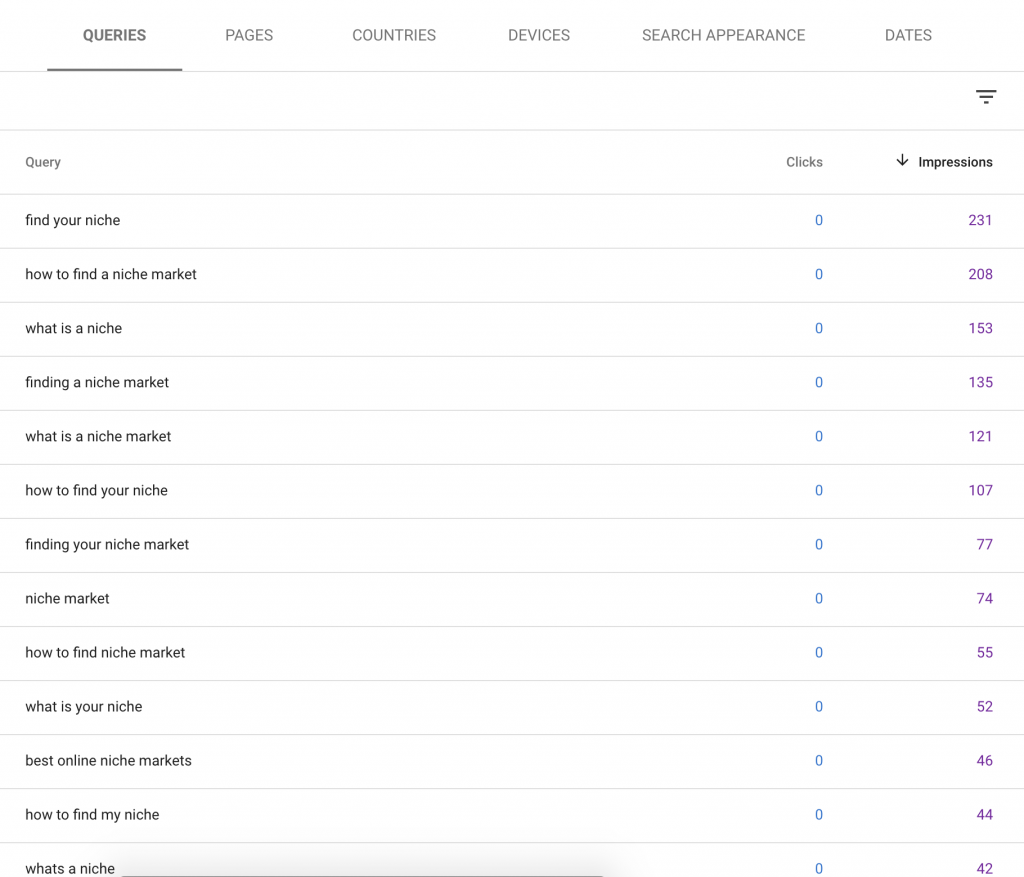
As you can see, there are not many clicks yet but only impressions which is fine for me at the moment. But this information is very crucial.
For starters, the impressions you see is a good measure of search volume of that given keyword. Secondly, this is how Google understands your content, and it looks like it seems to understand that I am offering solutions to the right problems, which is great!
Now, based on this accurate historical performance data, you can go back to your blog post and optimise for these keywords and increase your chances of rankings for those keywords and attract those clicks that you deserve.
Conclusion
I would like to believe that this is not only the most efficient method of performing keywords research, creating content and ranking on Google but also extremely effective.
To summarise this approach:
- Find “competitors” around your topic
- Figure out which keywords they are ranking for.
- Collate and segregate informational and educational keywords (problems).
- Create useful in-depth content (solution) around these keywords
- Optimise your content further based on the interaction from Google
Keyword research is 50% of SEO and if done right, you dramatically increase your chances of success.
Also, I would like to remind you that SEO is a long term game, so be patient with the results.
After all, you reap what you SEO 😉
Let me know what you think of this method in the comments.




By far the best thing I have seen on the internet regarding keyword research, step by step practicle guidance is easy to understand and follow.. thanks for the super informative article
Even I felt the same but I was expecting much more information on keywords research process.
good post and gave clarity on kw research
awsm sanjay sir but segregate part kind of confusing i hope you will create video on this content how to do advance keyword research.
My major problem solved today. I read lots of blogs can’t get this much clarity; my spending time is worth it.
My major problem solved today. I read lots of blogs can’t get this much clarity; my spending time is worth it
Amazing Sir really help me
I loved the title of this post. Using the word “Lazy” was a master stroke. It made me believe that anybody can do keyword research effectively without putting any exhaustive effort. Thank you Shanjay Shenoy for this easy-to-act guide on Keyword Research.
Hi Ankit, That was exactly the idea behind using the word “Lazy’!
Sanjay, thanks for this informative article.
I read somewhere that Bill Gates selected a lazy man to do a complex task believing that he will find the easiest way to accomplish the task.
Yes, writing articles after performing keyword research is a surefire way to success but many new bloggers skip this and write articles based on their interests.
And it’s no wonder that only a handful people read those articles.
Sanjay can you please write an article on a free tool which is as good as SEMrush or Ahrefs?
This is a very smart strategy, rank for low competition keywords, build authority and then, fight for high competition keywords.
What’s up Slick Sanjay! #belazy
Hi, Sanjay
Great article…especially the title brought me to your blog.
Loved your article…got a lot of insights.
Keep on sharing your knowledge with us.
Thanks
Rabin
Hello sir,
This article is very informative. Can you please clear the segregation part? How did you do that? If you explain, then there will be a lot of clarity.
Thanks sir
Hi sanjay I read this article and also I watched your webinar on SEMRush and you are amazing. I loved your content. it is very valuable to me keep writting it.
Pingback: What the Duck Is SEO & How Does It Work? - Sanjay Shenoy
Pingback: The Most Definitive Ahrefs Review (+ 5 Unique Ways To Use It) - Sanjay Shenoy
Hi Sanjay,
I have read this post and I really fall in love with it. Your writing style is unique. I become a regular reader of your Blog. Thanks for sharing.
Should we go for Long tail keywords in the beginning?
What a great article! I love the structure of this article and you made the advanced keyword research into a simple one. Deeply explained with all necessary information.
Before reading this article, I was also using Purchase intent keywords. Now I am going to start with the Informational keywords.
I request you to write more different article like this.
Cheers
Avinash P
Pingback: How I Ranked for 2400 Keywords with Zero Backlinks - Sanjay Shenoy
Pingback: What is SEO? A Simple Guide for Beginners
Pingback: Top 10 professional SEO Courses in Pune - Sanjay Shenoy
Pingback: Do you know the Top 10 Digital marketing firms in Chennai? - Sanjay Shenoy